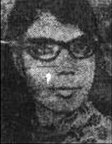Nesa, Meherun

Nesa, Meherun (1942-1971) litterateur, martyr in the War of Liberation. She was born on 20 August 1942 at Khidirpur in Kolkata. Her father was Abdur Razzak and mother Nurun Nesa. She had no opportunity in getting academic education, rather she was self-educated. Her family came to East Bengal in 1950 following the partition of India in 1947. She had to take up a job at a very tender age due to financial insolvency. She worked as a copy-writer in Bangla Academy for some time. Later she took a job at Philips Radio Company in 1961. Besides, she also worked as a copy-writer at the USIS Library.
Meherun Nesa started writing poetry from her early childhood. Her first poem Chashi was published in the daily Sangbad in 1952. Besides, a juvenile poem titled Aguan was also published in the same paper. She wrote a poem captioned Rajbandi on the theme of language movement, which was published in the periodical Kafela. This poem contained the slogans Amader Dabi Mante Hobey (Our demands must be met) and Rastrabhasa Bangla Chai (We want Bangla as state language). Most of her writings written between 1954 and 1971 were published in the weekly Begum. In addition, her writings were also published in papers like Kafela, Aaj, Awaz, Juger Dabi, Agnibeena, Ananya, Nao Belal, Pakistani Khabar, Dainik Pakistan, Krishikatha, Paigam, Sangram, Darbar, Troyee, Ittefaq, Lalana, Pak Jamhuriat, Anya Fagun, Keya, Mashik Mohammadi, etc as well as in Ingit, Philips Magazine published from Chittagong. She had in her poems a voice of protest, romanticism and realism. Many of her poems also demonstrated her political consciousness.
She played a noted role during the mass upsurge of 1969 as a member of the action committee formed in Mirpur. When the flag of independence was hoisted at Mirpur on 23 March 1971, she also raised the flag at her residence. At this stage, direct encounters began between the Bangalis and Biharis in Mirpur area. The Biharis attacked the residence of Meherun Nesa on 27 March and brutally killed her.
The Postal Department of Bangladesh Government issued a commemorative postal stamp in her name on the Martyred Intellectual Day on 14 December 1995. [Arifa Siddiqua]
